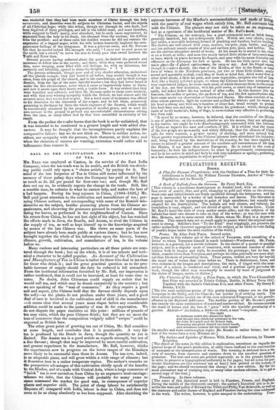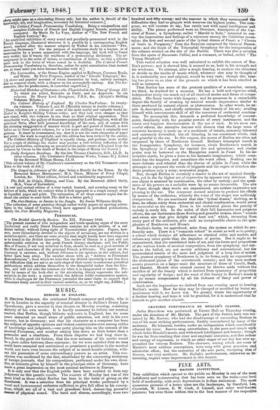PUBLICATIONS RECEIVED.
BOOKS.
A Pleafor Peasant Proprietors; with the Outlines of a Plan for their Es- tablishment in Ireland. By William Thomas Thornton, Author of "Over- Population and its Remedy."
A Book of Ballads from the German. By Percy. Boyd, Esq. [This volume is a handsome drawingroom or boudoir book, with an ornamental face cover of scarlet, blue, and gold, changing to gold and white on the obverse; wood-cuts and initial-letters are freely sprinkled through the letterpress, and the page is surrounded by a border of oak branches and leaves. The literature is scarcely equal to the typography in point of high excellence; but equally well adapted for the drawingroom. The ballads are well chosen, and various; the translation is easy, elegant, and not devoid of spirit: but it wantaforce.. Under Mr. Boyd's hand the style of every author seems alike; and the subjects of the ballads lose their own nature to take on that of the writer; as was the case with JSIrs. ilemans and to some extent with Moore, whom Mr. Boyd in a degree le- sembles. This remark does not so much apply to poems where the original senti- ment is strong. Schiller's lines "To the Ideal" read trippingly, yet preserve the rather melancholy character appropriate to the subject as he views it—the fading of youth's hopes under the stern realities of the world.] Poems. By Allan Park Paton. Second series. [The poems in this volume are of the school of Tennyson, with something of a writer to whom Tennyson himself is much indebted—Wordsworth. Mr. Paton, however, is a general, not a servile imitator. In the choice of a quaint or peculiar subject, and in a singular mode of treatment, with occasional touches of child- ishness both in images and style, he resembles his prototype; but he has, we think, sounder views than Tennyson, and perhaps his ideas generally are more origi- nal than his mode of presenting them. These poems, indeed, are very far beyond the usual run of verses that come before us. There is distinctness, force, and even richness in the images and descriptions; the style, if tinged with the man- nerism of a school, is condensed and vivid; and a poetical spirit pervades the book, though the effect may occasionally be marred by want of judgment in the choice of images, metre, or diction.] The Victories of the Sutlej; a Prize Poem, to which the Vice-Chancellor's first Prize was awarded at Trinity College, Dublin, in Hilary Term 1847. Together with the Sailor's Christmas Eve, and other Pieces. By Henry F. Brooks, T.C.D. [The two most ambitious poems of this pretty-looking volume are on the late campaign in the Sutlej, and the Church; but neither is of striking merit. The more serious portions remind one of the once celebrated Fitzgerald, or his pseudo- effusion in the Rejected Addresses. The warlike portion of Mr. Brooks's poetry has exactly the same combination of sound and matter-of-fact. He commemorates the death of heroes and the loss of " guns " with the truthful peculiarity of a gazette. Abdoul—" An Indian, a Sikh—in short, a man "—loquiutr.
The night In darkness ended this disastrous fight; And though two chiefs lay prostrate in the vale, Sir John Iii•Caskill and Sir Robert Sale, Unceasing slaughter thinn'd our fated bands,
And seventeen cannon fell into their banns."
On smaller and More commonplace topics Mr. Brooks is rather better; but the
best of his verses have a very .81ilesian air.]
The Satires and Epistles of Horace. With Notes and Excursus, by Thomas Keightley. [The object of the notes in this edition is explanation, sometimes as regards the general scope of the poet's production, at other times confined to the cotrstruction of sentences or the interpretation of words. The meaning is deduced from a va- riety of sources, from manners and customs down to the smallest question of grammar. The text and notes are printed separately, as is the present fashion, in order to preserve a typographical uniformity in the pages; but all notes for par- ticular illustration are (tor students' use at least) best printed at the bottom of the page; and we should recommend this change in a new edition. By far the most convenient way of studying this, or many other modern editions, is to get a second copy of the text.] Treachery. In three volumes. [The scene of this historical novel is laid in Flanders, France, and England, during the middle of the thirteenth century: the author's historical aim is to de- scribe the wars and policy of Edward the Third and Philip Van Artevelde, as well as the manners and social classes of England and Flanders during the time embraced in the work. The writer, however, is quite unequal to the undertaking. Tree- gory might pass as a circulating library tale; but the author is devoid of the knowiedge, art, and imagination, necessary for historical romance.]
The Critical French Pronouncing Vocabulary. Being a compendious and complete Collection of French and English Lingual Sounds, analogically compared. By Mann De La Voye, Author of "The New French and English Lexicon," &c.
(An :millrace] exhibition of every sound and peculiarly-pronounced word in the trench language, illustrated wherever it is possible by a corresponding English sound, marked after the manner adopted by Walker in his celebrated "Pro- nouncing Dictionary." For the purpose of continuous study by a learner, or of examination by a person acquainted with the language, the book will be found eery useful; but it wants the readiness of a pronouncing dictionary. The el-
ement is in the order of letters, or combination of letters; so that a referrer must look to the letter of whose sound he is doubtful. The Critical French Pronouncing Vocabulary is therefore, rather for quiet consultation than instant nse, at least until you have become familiar with it.] The Locomotive, or the Steam-Engine applied to Railways, Common Roads, and Water. By Peter Progress, Author of the "Electric Telegraph," &c. [A clever and popular account of steam locomotion by boat, railway carriages, and on common roads, with a chapter on the atmospheric railway. But The Lo- comotive, like its predecessors, is somewhat superficial.] Historical Sketches of Statesmen who Flourished in the Time qf George To which are added, Remarks on Party, and an Appendix. In six volumes. By Henry Lord Brougham, F.R.S., &c. (Knight's Shilling Voltunes. Reissue.) The Cabinet History of England. By Charles MacFarlane. In twenty- six volumes. Volumes L and II. (Monthly reissue in double volumes.) 'These volumes are a reissue of some of the most useful and valuable works in- aided in Knight's Shilling Volume series; and they look even cheaper as they now stand, with two volumes in one, than on their original appearance. That remarkable work, the gallery of Statesmen painted by Lord Brougham, with all his artistical force, often with personal knowledge of the men, and of course with the amusing exaggeration of manner which is part and parcel of himself, is here before us in three pocket volumes, for a few more shillings than it originally cost guineas. It must be remembered, too, that it is not the mere cheapness of paper and print: the work is copyright, and this edition has been revised by the author. The Cabinet History of England is equally cheap, and perhaps more useful. For a couple of shillings the reader may possess a well-written reflection of the original authorities, embracing an account of the public events of England from the invasion by Caesar to the death of Becket in the reign of Henry the Second.] Daily Scripture Readings. By the late Thomas Chalmers, D.D., LL.D. In three volumes. (Dr. Chalmers's Posthumous Works, Volume II.) Edited by the Reverend William Hanna, LL.D. [This second volume of Dr. Chalmers's commentary on the Old Testament comes down to the book of Job.] The Gospel in Advance of the Age; being a Homily for the Times. By the Reverend Robert Montgomery, M.A. Oxon, Minister of Percy Chapel, London, &c. Third edition, revised and considerably augmented.
The Bell, its Origin History, and Uses. By the Reverend Alfred Getty, M.A., Vicar of EcCleefield.
[A new and revised edition of a very varied, learned, and amusing essay on the !abject of bells, which we noticed when it first appeared in a rough enough shape as regarded paper and print. The exhaustion of all those coarser copies has in- duced the author to send forth The Bell in a better garb.]
The Out-Station; or Jaunts in the Jungle. By James Willyams Grylls. [The collection of some amusing though rather wordy papers on sporting adven- tures in the island of Ceylon, which have appeared in periodical publications, chiefly the New Monthly Magazine.]
PERIODICAL.
The British Quarterly Review. No. XII. February 1842. [The present number of this independent and truth-speaking organ of the more intellectual and really liberal Dissenters contains ten able articles, of a suf- ficient variety, without losing sight of Nonconformist principles. Papers how- ever, more immediately devoted to the objects of sectarians, are not written in a sectarian spirit; and there are some articles that might hardly have been expected to be found in the British Quarterly. The review of Dumas is a just and not unfavourable criticism on the great French literary charlatan; and the Public Men of France, if not very artistica] in form, should be read as a good account of the lives and characters of the principal French politicians. The paper on the Currency is extreme, and, without reference to our opinions on the subject, had better have been away. The number closes with an "Address to Protestant Nonconformists"; from which we infer that the British Quarterly is not free from the difficulties that are apt in an early stage of their career to embarrass periodical publications which address themselves to the thoughtful rather than the frivo lolls, and will not echo the common cry when it is exaggerated or untrue. Per- usal by means of the book club or the circulating library supersedes the sub- scription to the work; a course which the Address boldly remonstrates against, while it challenges for the Protestant journalist the same claim to support that Dissenters freely accord to their various societies, or, as we might say, hobbies.]



























 Previous page
Previous page